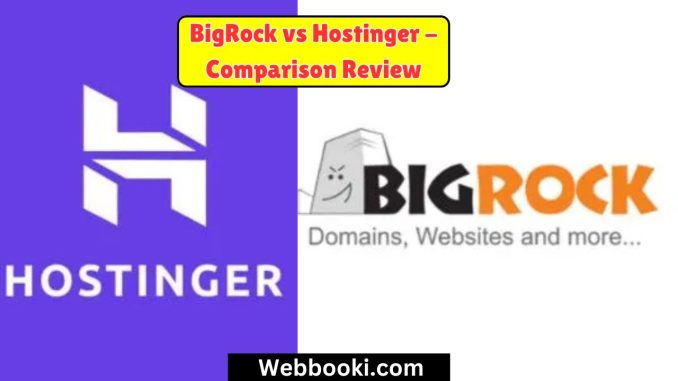
Speaking about web hosting, BigRock and Hostinger probably top the list of mentions. Both these service providers have a variety of services on offer since their clientele could range from a novice customer to an experienced developer. In this article, we review the main features, pricing, performance, customers support, and user experience both platforms offer to conclude which might be better for your needs.
Overview
BigRock is an Indian web hosting company that has been in the market since 2010. It offers a host of other services like domain registration, shared hosting, VPS hosting, and dedicated servers. BigRock’s market of operation is basically in India but does also cater to customers around the world.
At the other end, Hostinger is an established global web hosting provider, and the company is known for its inexpensive plans. Founded in 2004, Hostinger grew very fast; it offers shared hosting, cloud hosting, VPS hosting, and so on with a high level of speed and performance.
Price
BigRock is competitively priced, primarily its shared web hosting. Plans start off quite low, with free domain registrations on many in the first year. Renewal rates are generally much higher, but that is often standard in the industry.
Hostinger is accustomed to low-cost hosting. Their promotional prices still linger among the lowest on the market, and it’s among the best options anyone with a very stringent budget can get. Pretty often, Hostinger runs discounts and promotions that allow for even better affordability. Like BigRock, however, customers should pay careful attention to the pricing upon renewal.
Performance
For performance, Hostinger is known for both speed and reliability. Infrastructure is based on SSD drives, and most of their proprietary servers twenty-five in-house run LiteSpeed, which adds to speeds. Hostinger also has data centers from around the world; users can choose which one is closest to their audience.
While it is great and reliable too, BigRock does not provide the same pace as Hostinger. Their performance is good for most small or average-sized websites, but power users with more demanding requirements will enjoy better facilities in Hostinger.
Customer Care
In any hosting service, customer support is the most important factor. BigRock will provide 24×7 support through chat, phone, and email. Though they usually respond nicely, according to user reviews, response time differs, especially at peak hours of the day.
Hostinger also provides customer support day and night, committed to the speed of responses. The support team is available either through live chat or by using their ticketing system. Many current users have reported satisfaction with Hostinger’s support, citing speed and efficacy in the resolution of their issues.
User Experience
Both provide quite an intuitive user interface, though Hostinger comes with its custom-built control panel. Indeed, it really is intuitive and easy to handle for beginners when it comes to managing their hosting environments. Integration with website building tools, performance optimization options, and security features increases the usability of such a solution.
BigRock’s control panel is based on cPanel, so it should not be completely alien to users. While quite functional, it is still less intuitive compared to the design used by Hostinger. BigRock does offer some useful features, though, such as website builders and one-click installs for popular applications.
Conclusion:
In a nutshell, BigRock and Hostinger both have pros and cons. If budget-friendly options with solid performance and good customer relations are your target, then perhaps this is where Hostinger comes out on top. Global reach and superior speed will be beneficial for users who want to scale their websites using it.
On the other hand, BigRock caters to users who target the Indian market or to users who prefer cPanel for handling hosting services. It offers competitive pricing, especially shared hosting, but be wary of the renewal rates. Ultimately, the choice will be made based on what exactly one needs, and considering budget and preference.
Leave a Reply